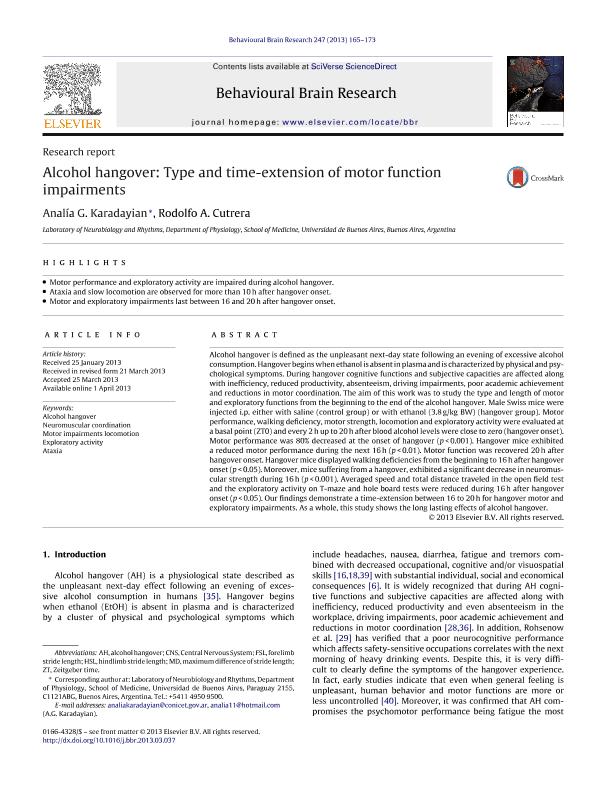Mostrar el registro sencillo del ítem
dc.contributor.author
Karadayian, Analia Graciela

dc.contributor.author
Cutrera, Rodolfo Angel

dc.date.available
2017-03-20T20:36:51Z
dc.date.issued
2013-06
dc.identifier.citation
Karadayian, Analia Graciela; Cutrera, Rodolfo Angel; Alcohol hangover: type and time-extension of motor function impairments; Elsevier Science; Behavioural Brain Research; 247; 6-2013; 165-173
dc.identifier.issn
0166-4328
dc.identifier.uri
http://hdl.handle.net/11336/14113
dc.description.abstract
Alcohol hangover is defined as the unpleasant next-day state following an evening of excessive alcohol consumption. Hangover begins when ethanol is absent in plasma and is characterized by physical and psychological symptoms. During hangover cognitive functions and subjective capacities are affected along with inefficiency, reduced productivity, absenteeism, driving impairments, poor academic achievement and reductions in motor coordination. The aim of this work was to study the type and length of motor and exploratory functions from the beginning to the end of the alcohol hangover. Male Swiss mice were injected i.p. either with saline (control group) or with ethanol (3.8 g/kg BW) (hangover group). Motor performance, walking deficiency, motor strength, locomotion and exploratory activity were evaluated at a basal point (ZT0) and every 2 h up to 20 h after blood alcohol levels were close to zero (hangover onset). Motor performance was 80% decreased at the onset of hangover (p < 0.001). Hangover mice exhibited a reduced motor performance during the next 16 h (p < 0.01). Motor function was recovered 20 h after hangover onset. Hangover mice displayed walking deficiencies from the beginning to 16 h after hangover onset (p < 0.05). Moreover, mice suffering from a hangover, exhibited a significant decrease in neuromuscular strength during 16 h (p < 0.001). Averaged speed and total distance traveled in the open field test and the exploratory activity on T-maze and hole board tests were reduced during 16 h after hangover onset (p < 0.05). Our findings demonstrate a time-extension between 16 to 20 h for hangover motor and exploratory impairments. As a whole, this study shows the long lasting effects of alcohol hangover.
dc.format
application/pdf
dc.language.iso
eng
dc.publisher
Elsevier Science

dc.rights
info:eu-repo/semantics/openAccess
dc.rights.uri
https://creativecommons.org/licenses/by-nc-sa/2.5/ar/
dc.subject
Alcohol Hangover
dc.subject
Neuromuscular Coordination
dc.subject
Motor Impairments Locomotion
dc.subject
Exploratory Activity
dc.subject
Ataxia
dc.subject.classification
Otras Ciencias de la Salud

dc.subject.classification
Ciencias de la Salud

dc.subject.classification
CIENCIAS MÉDICAS Y DE LA SALUD

dc.title
Alcohol hangover: type and time-extension of motor function impairments
dc.type
info:eu-repo/semantics/article
dc.type
info:ar-repo/semantics/artículo
dc.type
info:eu-repo/semantics/publishedVersion
dc.date.updated
2017-03-20T17:41:25Z
dc.journal.volume
247
dc.journal.pagination
165-173
dc.journal.pais
Países Bajos

dc.journal.ciudad
Ámsterdam
dc.description.fil
Fil: Karadayian, Analia Graciela. Consejo Nacional de Investigaciones Científicas y Técnicas. Oficina de Coordinación Administrativa Houssay. Instituto de Bioquímica y Medicina Molecular; Argentina. Universidad Favaloro. Facultad de Medicina. Departamento de Cs.fisiologicas; Argentina
dc.description.fil
Fil: Cutrera, Rodolfo Angel. Consejo Nacional de Investigaciones Científicas y Técnicas. Oficina de Coordinación Administrativa Houssay. Instituto de Fisiología y Biofísica Bernardo Houssay; Argentina. Universidad de Buenos Aires. Facultad de Medicina. Departamento de Ciencias Fisiológicas; Argentina
dc.journal.title
Behavioural Brain Research

dc.relation.alternativeid
info:eu-repo/semantics/altIdentifier/doi/http://dx.doi.org/10.1016/j.bbr.2013.03.037
dc.relation.alternativeid
info:eu-repo/semantics/altIdentifier/url/http://www.sciencedirect.com/science/article/pii/S0166432813001782
Archivos asociados
